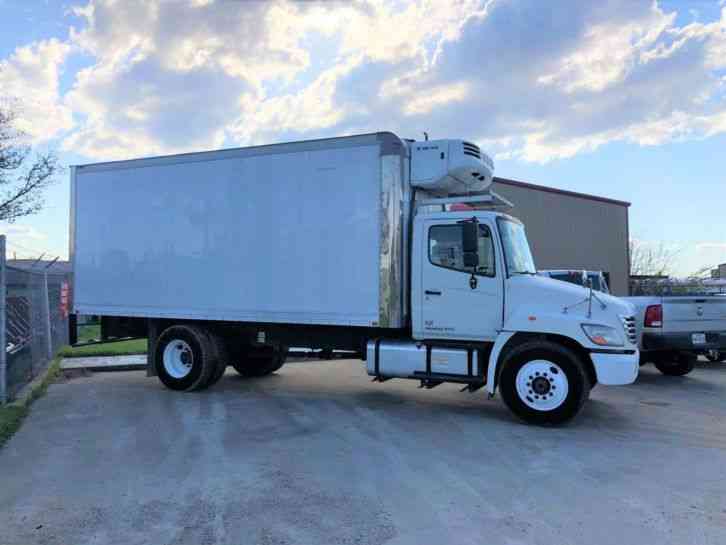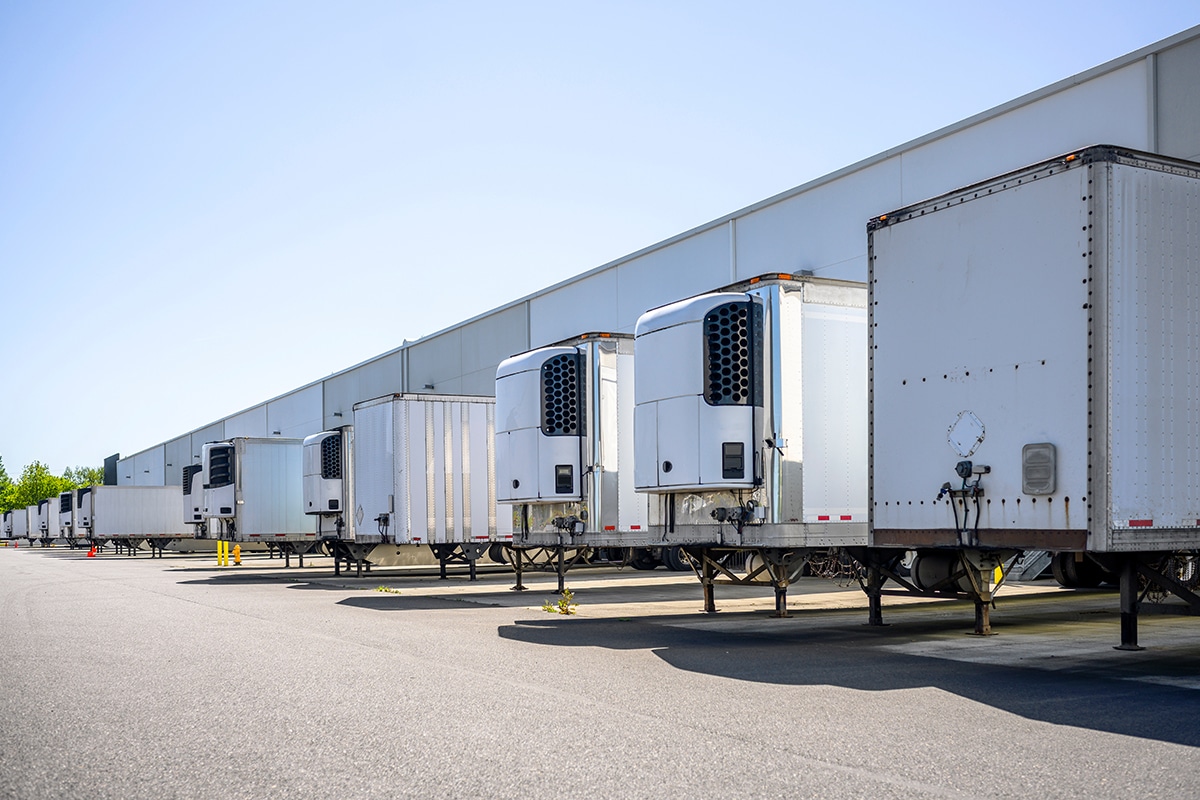Pick Thermo King Truck Refrigeration for Long-Haul Quality
Pick Thermo King Truck Refrigeration for Long-Haul Quality
Blog Article
Top Developments in Transport Refrigeration: Enhancing Performance and Security
The landscape of transport refrigeration is undergoing significant transformation, driven by technologies targeted at improving both effectiveness and safety. Trick improvements such as smart temperature level tracking systems, green cooling agents, and automated route optimization are crucial in dealing with the industry's obstacles. These technologies not just guarantee the integrity of temperature-sensitive products but additionally contribute to sustainability initiatives. As these advancements proceed to evolve, it is necessary to explore their effects on operational methods and regulatory compliance, motivating a closer evaluation of just how they reshape the future of transport refrigeration.
Smart Temperature Keeping An Eye On Solutions
In the world of transportation refrigeration, smart temperature tracking systems have actually arised as a crucial development for making certain the honesty of temperature-sensitive items. These advanced systems leverage Internet of Things (IoT) technology to offer real-time data on temperature changes, allowing drivers to preserve ideal problems throughout the supply chain. By constantly tracking the temperature level of cooled containers and automobiles, firms can promptly determine inconsistencies that might jeopardize product high quality.

Additionally, smart tracking systems often include automated notifies and alerts, permitting stakeholders to respond promptly to any kind of prospective issues. This proactive approach not only decreases the risk of wasting yet also improves conformity with regulatory requirements controling food safety and security and pharmaceutical transport.
The combination of information analytics within these systems also assists in anticipating upkeep, helping operators to anticipate potential equipment failings prior to they take place. This capability decreases downtime and maximizes functional efficiency, ultimately leading to cost financial savings.
Eco-Friendly Refrigerants
Smart temperature level surveillance systems play an important function in keeping item quality, but the efficiency of transportation refrigeration additionally hinges on the option of refrigerants utilized. In comparison, arising alternatives like hydrocarbon-based refrigerants and hydrofluoroolefins (HFOs) existing reduced GWP alternatives, offering both efficiency and sustainability.
These environmentally friendly refrigerants not only reduce environmental effect however additionally straighten with international regulations aimed at phasing out damaging compounds. Their fostering can cause boosted power performance, inevitably decreasing operating expense for transportation refrigeration systems. The use of all-natural cooling agents, such as ammonia and carbon dioxide, has actually gotten traction due to their outstanding thermodynamic residential properties and lower environmental impact.
Purchasing environment-friendly refrigerants is not merely a regulatory conformity procedure; it represents a strategic choice that improves brand online reputation and promotes customer commitment. thermo king truck refrigeration. By prioritizing lasting methods, companies can add to a greener future while guaranteeing the honesty of delivered products
Advanced Insulation Products
Using innovative insulation materials is crucial for maximizing transport refrigeration systems, as they significantly boost energy performance and maintain regular temperature control. Typical insulation methods usually fall brief in avoiding thermal transfer, bring about boosted power usage and fluctuating temperature levels within refrigerated areas.
Emerging materials such as vacuum insulated panels (VIPs) and aerogels supply superior thermal resistance, permitting thinner profiles without endangering performance. VIPs, for example, use a vacuum cleaner layer to minimize convective and conductive warmth transfer, making them perfect for space-constrained applications. Aerogels, recognized for their lightweight and porous framework, provide phenomenal insulation while considerably minimizing total system weight.
Moreover, incorporating phase modification products (PCMs) right into read this article insulation systems can further support temperature levels throughout transportation. These products soak up and launch thermal energy, properly buffering versus outside temperature level variants.
The assimilation of these advanced insulation materials not only decreases the operational costs related to energy usage however likewise prolongs the life span of temperature-sensitive products. As the transport refrigeration industry remains to develop, the adoption of innovative insulation technologies will be pivotal in improving both effectiveness and security in cooled transport.
Automated Route Optimization
The efficiency of transport refrigeration systems is greatly enhanced via automated course optimization, which leverages innovative formulas and real-time data to figure out one of the most effective paths for distribution. By assessing different aspects such as web traffic patterns, weather problems, and distribution windows, these systems can considerably decrease traveling time and gas usage.
Automated route optimization minimizes human mistake and subjective decision-making, which can bring about ineffectiveness. This technology makes it possible for fleet supervisors to assign resources better, making sure that refrigerated items preserve their required temperature level throughout the journey. By maximizing paths, companies can likewise enhance consumer fulfillment with prompt shipments.
Moreover, automated systems can adjust to unforeseen conditions, such as road closures or sudden web traffic spikes, allowing for dynamic that site rerouting. This flexibility not only shields the stability of temperature-sensitive items but additionally contributes to total operational performance.
Carrying out automated path optimization can lead to considerable expense savings while decreasing the carbon impact related to transport. As companies significantly prioritize sustainability, this development attracts attention as a vital component in modern transport refrigeration, straightening functional goals with environmental obligation. Inevitably, automated course optimization represents a considerable improvement in the pursuit for efficiency and security in transport refrigeration.

Real-Time Data Analytics
Automated course optimization substantially take advantage of the integration of real-time information analytics, which offers crucial understandings into the performance of transportation refrigeration systems. By utilizing real-time information, transport drivers can keep track of temperature variations and equipment performance, ensuring that disposable goods are kept within required criteria throughout transit. This aggressive method not just enhances the top quality of the carried items yet likewise mitigates the danger of spoilage and loss.

Along with improving efficiency, real-time analytics boosts security by making sure compliance with governing requirements for temperature control. This not just secures public health however also strengthens a business's reputation - refrigerated transportation thermo king. As the transport refrigeration sector progresses, the integration of real-time information analytics emerges as a keystone for driving development, sustainability, and functional excellence
Verdict
To conclude, the advancements in transportation refrigeration significantly boost both efficiency and safety and look what i found security within the industry. Smart temperature level monitoring systems and real-time information analytics provide vital oversight, while environmentally friendly cooling agents and advanced insulation products add to sustainability and energy performance. Furthermore, automated course optimization algorithms not only lower travel time yet also lessen environmental influence. Jointly, these innovations represent an essential advancement in transport refrigeration, guaranteeing conformity with governing criteria and promoting a greener future.
The landscape of transportation refrigeration is undergoing significant change, driven by developments aimed at enhancing both efficiency and security.Smart temperature monitoring systems play a vital role in maintaining product quality, yet the effectiveness of transportation refrigeration additionally pivots on the option of cooling agents utilized. Their adoption can lead to enhanced power performance, inevitably lowering operating prices for transport refrigeration systems. Ultimately, automated route optimization stands for a substantial improvement in the mission for efficiency and safety in transportation refrigeration.
In final thought, the improvements in transport refrigeration significantly boost both performance and security within the industry.
Report this page